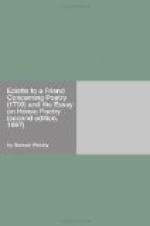—— totos
infusa per Artus
Mens agitat Molem, & magno se corpora
miscet.
He’s soft with the height of Majesty, his Marcellus, his Dido, and, I think, above all, his Elegy on Pallas is very noble and tender. The joints so strong and exactly wrought, the Parts so proportionable, the Thoughts and Expression so great, the Complements so fine and just, that I could ne’er endure to read Statius, or any of the rest of the Antient Latins after him; with whom therefore I shan’t concern my self nor trouble my Reader. Ariosto was the first of the Moderns who attempted any thing like an Heroic Poem, and has many great and beautiful Thoughts; but at the same time, ’tis true, as Balzac observes, that you can hardly tell whether he’s a Christian or an Heathen, making God swear by Styx, and using all the Pagan Ornaments; his Fancy very often runs away with his Judgment, his Action is neither one nor simple, nor can you imagine what he drives at; he has an hundred Hero’s but you can’t tell which he designs should be chief: Orlando indeed seems a wild Imitation of Homer’s Achilles, but his Character is not bright enough to make him the Principal; and besides he orders it so, that he does more great Actions when he’s mad then when sober. Agreeable to this are Rapin’s thoughts of him, which, in few words, are “That he’s elevated and admirable in his Expressions, his Descriptions fine, but that he wants Judgment; and speaks well, but thinks ill, and that tho’ the Parts are handsome enough, yet the whole Work can by no means pass for an Epic Poem, he having never seen the Rules of Aristotle;” which he thinks Tasso had, and therefore wrote much better, whom he commends as more correct in his Design, more regular in the ordering his Fable, and more accomplish’d in all parts




